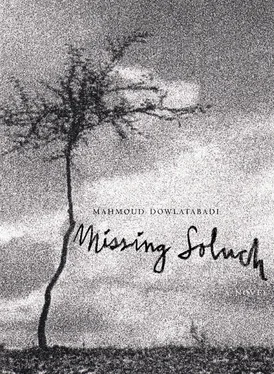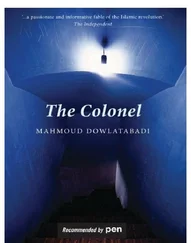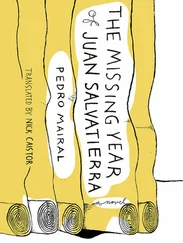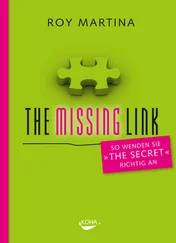The men sat, Salar at the doorway, and the Kadkhoda by the stove. Hajer slid away from the Kadkhoda, who sat beside the stove in such a way as to position his crotch close to the faltering heat of the fire. Because of this, in order to look at Mergan so as to speak directly to her, he had to twist his large head on his shoulders, straining to face her.
“Go bring those four bits of copper work!”
Mergan stayed just as she had been, with her back to the wall, hugging her knees silently.
The Kadkhoda repeated, “Get up. Get up and go bring those four pieces of copper work!”
Mergan still did not respond. Did not move. Salar was eyeing her. Her parched cheeks and drawn profile were discernible in the flickering light of the tallow-burner. A stubborn silence had her frozen in her place as if she were not alive, like the outline of a woman cut from stone. But Salar was agitated. His spleen held more than a few things that he wanted to bestow on Mergan and her boys. But since Kadkhoda Norouz had come to mediate, it would not have been to his advantage to let loose at this time. The Kadkhoda turned his head again and shouted at Mergan, “Have you gone deaf? I told you get up and get those four bits of copper work! Do I have to become rude with you?”
Mergan, staring ahead at the floor, said, “You go get them yourself. You know where they are.”
The Kadkhoda replied, “If you don’t go get them yourself, that’s what we’ll have to do. I’ve not come here just to sit and look at you!”
Mergan replied, “May God repay you for your kindness!”
The Kadkhoda smarted from the sting of the remark, and said, “A deal is a deal. Brotherhood has its own place — one brings wheat, and leaves with apricots. Salar, you go yourself. Get up and go get the copper pieces from their place and bring them here. Get up — while I’m here, it isn’t against the law.”
Salar Abdullah was ready and he rose to enter the pantry. The others in the room — Mergan, the Kadkhoda, Hajer, and Abrau — each remained silent in their own way. The clanging sounds of copper could be heard on the other side of the curtain. Salar Abdullah drew the curtain back, placing the copper pieces outside one by one. Finally, he exited the pantry, a goblet in one hand, and said to Kadkhoda Norouz, “The copper’s less than half of what it was, Kadkhoda! Come and see for yourself!”
The Kadkhoda rose, went to the doorway of the pantry, and fell into thought while looking at the copper work set out there.
“Ten seers , half a man … Fifteen seers . Estimate this one piece at seven seer ; all together it comes to … ten, thirty, fifteen, and seven — my guess is this is, all together, about one man and two seer . So we’re short four man and two more seer . So …?”
Before anything further could be said, Salar Abdullah removed the tallow-burner from the shelf, went back into the pantry and looked in all the nooks and crannies, came out and replaced the tallow-burner to its place, and said, “Nothing. They’re not here. They’ve melted into thin air!”
Mergan remained silent, looking at a spot in front of her feet. But she could sense the sharp glare of Salar and the Kadkhoda on her. She was ready for a fight. She’d made all of the calculations. Perhaps that was why she was so firmly frozen in her place. Like a dragon protecting treasure. She had no choice. The earth itself was the only thing giving her support. She had no desire to rise, to stand. She didn’t want to have her knees begin shaking from the Kadkhoda’s and Salar’s accusations and quarreling. She wanted to hold her own. That was why she was firmly fixed to her seat on the earth.
Salar said, “Thief! She’s taken a hand to the copper. I’d seen them myself! A pot, a bathing pitcher, a tray, the vase, and a set of pieces coming to thirty seer . It wasn’t just these four worthless bits of copper. She’s taken a hand to my property!”
Your property?
It would have been natural for Mergan to say this, but she didn’t. She only thought it. The Kadkhoda approached her with wide strides and stood beside her and asked, “So what’s happened to the rest? Where did you put them?”
Mergan’s mouth remained firmly shut. The Kadkhoda repeated, “I’m with you! Where did you put them?”
Kadkhoda Norouz’s voice was shaking. Mergan couldn’t remain silent any longer, so she said, “Just where they were before!”
Salar cut her off, saying, “They’re not! All there is are these four worthless bits of copper work! Where are the valuable pieces?”
Mergan replied, “They’ve gone to hell — where are they? What do I know where they are? He himself, his own cursed self, he’d come and take one piece every night to melt down. So what do I know? He’d come and go to the nearby villages — maybe he’s left them with a friend of his. God burn his cursed soul for absconding holy Zaynab’s rights!”
Salar began shouting out of control, “It’s a lie! A lie! She’s lying while swearing on the purity of Zaynab! It was your own dishonorable self who absconded with the coppers!”
Mergan stared at Salar a moment and said, “Me? May my hands dry up if I’ve even touched these copper pieces. May my children wither and waste before me if my soul had any idea of what happened to them. Soluch, that son of a bitch himself, was the one who’s made off with my bathing pitcher, my vase and tray, and the rest of them, and has sold them!”
“You’re lying, you and your seven backs, you witch! That man wouldn’t touch the property of others. Soluch wasn’t the kind of man to steal something from his own property!”
“His own property! How could he have gave gotten it? Oh, maybe he inherited it from his father, a mud-plasterer! Do you remember when his old man died what he left for him? A plastering spade. That was all. His property, his property! It’s as if you think I was the wife of the son of a nobleman and I didn’t even know it!”
Salar said, “Will you swear on the Qur’an?”
“Swear what on the Qur’an?”
“That you didn’t steal the copper work yourself!”
Mergan ran toward Hajer, embraced her daughter, slapped her head, and said, “May I bury my own daughter! May I bury her with my own bare hands, if … if I should know anything about this. Kadkhoda! At least say something to this man!”
Kadkhoda Norouz knew Mergan well. Not just Mergan, but also he knew most of the people in Zaminej better than anyone else did. And that was why he was the Kadkhoda, and not Salar Abdullah. So he knew that if the matter should be drawn out any further, Mergan would not hesitate to even lift Hajer up and smash her into Salar’s head, and Kadkhoda Norouz didn’t want this to happen. He didn’t want something like this to happen while he was there. Mergan’s attack on Salar Abdullah earlier was a consequence of a similar situation. So the Kadkhoda wisely realized he would have to take a moderating position. To step on Mergan’s tail more than this would be unwise. Mergan was that kind of person that the Kadkhoda and Salar Abdullah termed “headless and footless”—out of control. From one standpoint, they were right, since Mergan had never had an opportunity to distinguish her head from her feet. In a sense, her head had never benefited from a strong neck; her feet had never had shoes. But if they meant “headless and footless” to signify something else, then it was up to the Kadkhoda to know what that was. Because Mergan exemplified the working woman of Zaminej. She was perhaps the hardest-working woman of the village. She was like a sharp sword. She never rested. Once she began, she could do the work of two men. Strong and obstinate. And so the Kadkhoda estimated that Mergan would not back down. He turned to Salar and said, “Leave it. Just take these four pieces, and we’ll later deal with the remainder.”
Читать дальше












